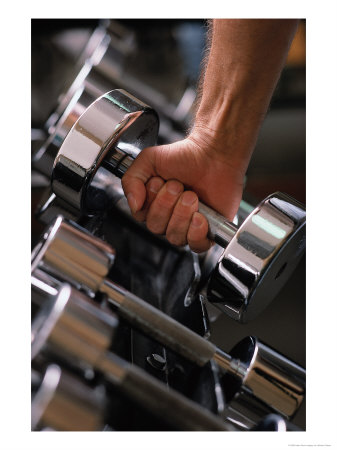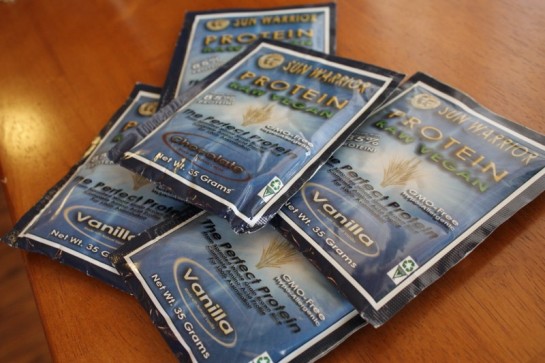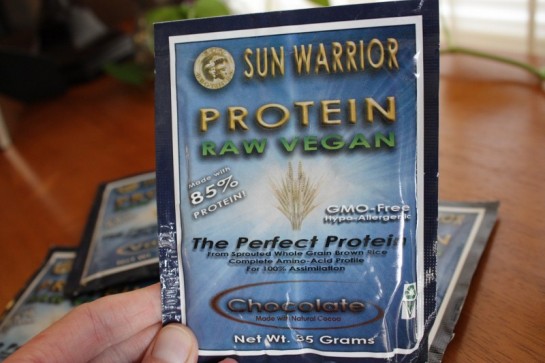Ah, so glad it’s Friday!! I’m really looking forward to having an extra day off in addition to a special day with Chris. Cue awwwwwhs here lol Nah we don’t really have anything too crazy planned. Our good friends are having a Valentine’s Party, my other friend is having a housewarming party and we are having a ‘cook together’ party for V day. We were thinking about making reservations and going out, but we enjoy cooking together so much we finally decided it would be better to stay in (and save money!) But we’ll see if we change our minds last minute 🙂 On to the FYF topic for today . . .
Many athletes, especially those looking to build mass and bulk up, believe that whey protein is the magic bullet that will give them the optimal results they crave. We see those giant bottles of whey protein in the health food stores and muscle men carrying their protein shakers and gallons of water, so I wanted to look into the specific topic of whey protein further to see if there really is any added benefit. . . .
Whey protein is basically the fluid portion of milk and contains high concentrations of the amino acids leucine, isoleucine and valine important for recovery, and there are different types of whey protein available:
- WP Concentrates – 80% protein, also contain lactose
- WP Isolates – 90-95% protein, less lactose, more expensive
- Hydrolyzed WP – already broken down into individual peptides, usually in sports/recovery drinks, infant formula. (There really isn’t any added benefit to having them broken down, but it can help with milk allergies).
There are also different methodologies used to measure protein requirements:
- Nitrogen Balance – there’s always a statement of wanting to maintain a positive nitrogen balance in order to build muscle mass, but really this form of methodology does not distinguish between catabolic and anabolic processes within the body.
- Stable Isotopes – This is a much more scientific method that measures the point at which one’s AA oxidation increases exponentially to determine one’s protein needs. Basically it can see the point that you are no longer using ingested protein and are just exceeding your needs by oxidating the excess.
- Others include: Urinary Creatinine and Urinary 3-Methly Histamine
What are the Recommended Protein Requirements?
- Sedentary – 0.8g/kg per day
- Endurance Athletes – 1.2-1.4g/kg per day
- Resistance Athletes – 1.4-1.7g/kg per day (no benefits have been shown above 1.7g/kg)
So an endurance runner who weighs 140 lbs would need anywhere from 76 – 89g of protein per day, which is very doable with real foods. A resistance trained athlete of the same weight would need from 95 – 108g of protein per day. Many Americans today eat well within the required amount of protein, and excessive amounts of protein are not considered beneficial. The kidneys have to work harder to process all that extra nitrogen from protein breakdown (hence the muscle builders with gallons of water), although there isn’t much research saying too much protein will harm the kidneys in a healthy person. Also, if more protein is consumed for one’s calorie needs it can be made into fatty acids for storage!
Other areas to pay attention to when considering the whole picture of increasing lean body mass are:
- Adequate energy intake is necessary for skeletal muscle protein synthesis! You can eat a ton of protein, but if your not getting adequate calories to support that increase in muscle mass, nothing is really going to happen.
- Adequate carbohydrate is necessary to spare muscle protein from being broken down for energy, especially with endurance athletes. No Atkins Diets, please!!! yes, even resistance athletes need carbohydrates, but in smaller amounts.
- Weight training, in addition to protein consumption, is needed to see any benefits of course! It’s not only the protein that chisels our muscles, but the actual work we impose on them. All those little tears in the muscle from a workout causes them to build up bigger each time if we fuel properly.
Optimal Protein Dosing/Timing:
- Consuming as little as 6-10g of protein before resistance training may increase protein synthesis.
- Up to 15% of energy needs during endurance events can come from protein (primarily branched chain AA) and some research has found it may be beneficial to include a small amount of protein during longer endurance events (Accelerade is an example of an electrolyte beverage w/ added protein).
- Protein synthesis increases 3-24 hours after resistance training. 20 grams of protein has been found to be the optimal dose after resistance training to increase protein synthesis and not contribute to AA oxidation. I like to recommend refueling in general within at least 15-30 minutes of working out.
Now on to the real question here, is there a benefit with using whey protein in particular???
There are numerous studies out there claiming better gains with whey, while others do not. Basically, I can conclude that there is not one single form of protein that appears to be absolutely the best for increasing skeletal muscle. What is important is to make sure one is getting adequate calories and a variety of high quality protein for their needs. If an individual finds that using a protein powder is more convenient for them to get their protein then that is fine, but it is always fairly easier and much cheaper to get one’s protein from high quality sources found in real food! I am not opposed to whey protein because it does come from real food (milk), and is a great way to get adequate protein in one’s diet. The only cause for concern with any supplement, especially if one is competing at the collegiate level, is contamination. One always has to take supplements with extreme caution in this case.
Other sources of protein I’ve been interested in, particularly for vegetarian and vegan based diets, include hemp and brown rice protein. I haven’t looked at the specific research with these products, but Sun Warrior sent me a few of their raw vegan brown rice protein flavors to try. I was very interested to find that in one scoop there is 70 kcals and 16g of protein! That’s pretty amazing coming from brown rice. It also contains 1.3 g leucine which isn’t as much as found in whey, but is still a considerable amount. I tried it after a body pump full-body weight training session and mixed one packet with about 1 cup of milk in the morning for my session later in the afternoon. It was grainy to be honest and the taste itself was different to me than whey. It might have been better if I mixed it right when I wanted to have it because grains swell when added to liquid? Hmm . . . I think this would be much better in a smoothie with other ingredients because I wasn’t fond of the taste on its own. I still need to try the Vanilla.
| Protein Source | Isoleucine | Leucine |
| Met-RX Whey (1 scoop) | 1.4 | 2.3 |
| 16 oz Choc Milk | 1.2 | 1.9 |
| 6 oz can of tuna | 2.0 | 3.5 |
| 1 cup cottage cheese | 1.6 | 2.9 |
Another important thing to consider with all this protein supplement business is the considerable cost of all these products. On average a large carton of whey protein will cost you anywhere from 30-60 bucks and that is quite a lot if you’re going through that stuff like water. Potentially it could add up to $600 per year! These prices aren’t exact, but just to give an idea:
| Protein Source | g protein/serving | Cost/gram | Cost per serving |
| 4 oz deli beef | 32 | .04 | 1.25 |
| 6 oz can of tuna | 40 | .03 | 1.00 |
| ¼ cup powdered milk | 8 | .03 | .21 |
| 2 egg whites | 7 | .02 | .21 |
| Met-RX whey | 38 | .06 | 2.70 |
| Power Bar | 23 | .10 |
2.29 |
Even though there has been some beneficial results shown with whey protein, many other studies don’t yield the same results. It is important to get a variety of high quality protein sources in one’s diet, particularly from real food if possible. Make sure adequate calories are consumed overall to see any kind of muscle mass increase. In addition, actually engaging in challenging weight training is essential for any kind of ripped results. So just because I like to add a scoop of whey mixed with about 6 oz of NF milk after my weight training sessions for added convenience and quick recovery doesn’t mean I’m automatically going to look like a bodybuilder . . . We must weight train pretty dang intensely for that! Plus it’s just harder for some women to ‘bulk’ up and genetics play a large role in body composition.
What do you think about whey protein? Do you use a protein supplement?
Any Valentine’s Day plans? Even if you have or significant other or not, I hope it’s a day filled with LOVE!








My son does the protein powder – so he is carefully going over the post. My husband does the tuna. And I just do some nuts – but I don’t lift weights – for real. Fascinating post.
Comment by Claudia — February 12, 2010 @ 9:23 am
Claudia, thanks! I appreciate you stopping by 🙂 Have a nice weekend, I’ve been drooling over all your food pictures!
Comment by Kristen :) — February 12, 2010 @ 3:38 pm
kristen!!! love love love this post! I was just explaining last night to my metabolism class about research involving calcium excretion and excess protein, and how we need to meet our energy needs in CHO because of CHO sparing effect, etc.
i love reading your posts, its like “ah someone that knows what I know and knows what they are talking about!”
I do supplement with whey protein, because of the heavy training schedule for running and working out that I usually do and because I find it easier to have on hand. Although, I use it as its intended- supplemental- I do base my diet on egg protein, meat protein, original protein sources.
Have a great weekend- hope valentines is special !!
Comment by bhealthier — February 12, 2010 @ 10:15 am
Laural, thanks! CHO are so important. I was reading in one of my probiotic studies that carbs affect natural killer cell redistribution in immunity (Nieman et al., 1997). So neat! I like whey too because it is convenient. Have a nice weekend too! 🙂
Comment by Kristen :) — February 12, 2010 @ 3:36 pm
I love sun warrior protein I’m dying to try the chocolate and vanilla flavors jealous! x x
Comment by Tamizn — February 12, 2010 @ 2:20 pm
What an interesting post! I have always wondered about whey proteins vs. a soy protein. I use a hemp protein powder by Manitoba Harvest which I really have come to like, but I have heard that Sun Warrior is one of the best protein shakes out there. The only reason why I havent ordered it yet is because it is a bit on the expensive side.
Im working on valentines day, but I get off at seven and then Ill be spending the evening with my favorite person and best friend (my mom :)) I cant wait to give her the gifts and goodies i bought her.
Enjoy your weekend Kirsten.
Comment by Michal — February 12, 2010 @ 4:31 pm
[…] Original post by Kristen […]
Pingback by whey protein | eatingRD.com | Protein-supplements | protein-supplements are best for diets — February 12, 2010 @ 8:58 pm
Kristen I love how real you are and how truthful and reliable this information is. I really hope that this ADA lady agres to send me that supplement book, so I can send you mine, as there is a lot of information about whey protein that you should read (very similar to what you’ve said in this post!). I like to tell people that whey is a great source of protein, but don’t expect anything miraculous. IT’s just not going to happen. Also, I’m glad you debunked the “high protein” myth.
Well last night Nick and I celebrated V-day with steak and lobster. IT was AMAZING. Then we had gluten free brownies (yum) with homemade chocolate and peanut butter ice cream! He works on Sunday so that was our low-key Valentine’s day. I hope you have a great one too!
Comment by The Candid RD — February 13, 2010 @ 6:11 am
[…] whey protein | eatingRD.com […]
Pingback by Animal-friendly Athletic Shoes by Stella McCartney » VWOM Blog | Shoes Beauty Wisdom — February 13, 2010 @ 10:13 am
thanks for the Neiman article! I love their work- Happy Valentine’s Day!!! I posted about my “divorce” I guess you could say- nervous about the response. I love that you left a party early without drinking so that you could ride- I have been making similar choices, and although I feel old, it makes me feel healthier!
Comment by bhealthier — February 14, 2010 @ 9:14 am
awesome info. Im just starting to really get into weight training. It was something that Ive been missing for awhile in my routines. Im definitely a endurance type person! So I was really interested in seeing if I need to alter my diet in any way. I do eat plenty of protein from natural food sources though so I haven’t really relied on any protein powders or anything. So Im so glad you researched it. Ive been wanting to try SunWarrior too for awhile as well. Thanks for the amazing info! Have an awesome night!
Comment by chrysta — February 15, 2010 @ 12:15 am
Great post! My dad just bought a big thing of whey protein. I was trying to explain to him a bit more about it but didn’t know a whole lot. Thanks for the info.
Hope your’e enjoying your Monday off!
Comment by Kristen — February 15, 2010 @ 8:33 am
Thanks for the interesting discussion of whey protein. It’s good to have all this information in one spot! I’m going to forward this to my friend who is really interested in weight-lifting and protein – I know he’ll find this fascinating!
Comment by Jessie — February 15, 2010 @ 5:31 pm
Thanks for all this great info! I usually have hemp protein powder that I’ll add mainly to smoothies. Whey tends to upset my stomach so I avoid it as much as I can.
I’ve been interested in trying an egg white protein powder… any thoughts or info about that?
Comment by Heather @ Get Healthy WithHeather — February 15, 2010 @ 8:07 pm
Informative post. I’m a huge fan of protein powder (whey, rice, vegan, whateva) mainly because it’s the easiest way to get the amount of protein I need. I do a lot of weight training and eat a lot more than the values you suggest (I’m suppose to be at 200g a day). I’ve found I have more energy and my body responds (physically) better when I’m on a high protein, moderate carb diet, but I know that varies for everyone. I think an important thing to note in the protein comparison chart is the amount of sugar & sodium in each food. I love cottage cheese and tuna but both are so high in sodium, and of course chocolate milk has the sugar. I agree that there are wonderful whole food options, but for a healthy quick protein fix, I still love my protein powder 🙂
Comment by Alyson — February 15, 2010 @ 10:57 pm
Alyson, Thanks for your input since you have great experience in weights and intense building. Many recommendations are just that, recommendations that research has found, but it really depends on the athlete and their individual tastes and needs. Great point, many of those foods would probably be more appropriate for the endurance athlete who needs the sodium for fluid replenishment and sugar for glycogen replenishment from exhaustive anaerobic exercise 🙂
Comment by Kristen :) — February 15, 2010 @ 11:08 pm
I’m a fan of whey just because I somewhat limit my soy — I love tofu, so I wouldn’t also do a soy supplement. I like the taste, too 🙂
Comment by Nicole, RD — February 16, 2010 @ 1:03 pm
Wow, great post! Really informative. I try to drink a whey protein shake after a training session, which is usually 4 hours long, and it has TREMENDOUSLY affected my recovery! I used to feel immobile the morning after a workout…these days that is extremely rare. I try to get protein from other sources as well, but so far I’m a whey fan. 🙂
Comment by Pam @ The Unlikely Athlete — February 16, 2010 @ 10:05 pm